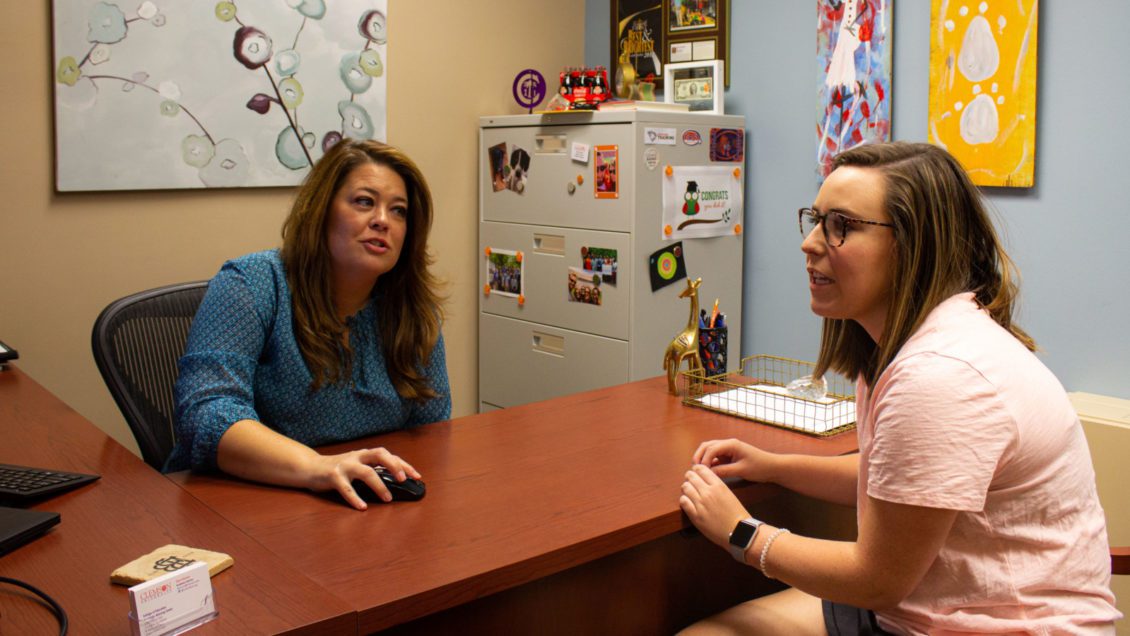
This fall, Clemson’s College of Education has become the first on campus to adopt a college-wide, four-year advising model for its undergraduates. College leadership and student advisors worked collaboratively to develop this approach, which they say aligns the college more closely with the ClemsonForward strategic plan.
This model positions academic advisors to manage all tasks related to student scheduling and degree completion, while faculty members become involved once students transition to the professional level of their respective program area. According to Michelle Cook, associate dean for undergraduate studies in the college, the move will be a true “win-win” for faculty, staff and students in the college as well as the college’s partner school districts.
“Our college prides itself on the personal attention we can give our students, and this model will allow both faculty and staff to give them a more specific level of support,” Cook says. “Our students will get consistent support from advisors, while faculty will be able to concentrate more on professional expertise and development.”
According to Jamie Garland, undergraduate academic advisor in the College of Education, this innovative model will streamline student records through the advising office while freeing up faculty time that has been spent on advising students in the past. This extra time allows faculty to concentrate more on teaching and their respective research interests.
For the advisors, the model focuses on sustained relationships to promote student retention, so undergraduate students work with either Garland or fellow advisor Staci Koonce throughout degree completion. Garland says this will allow advisors to focus on both building schedules and being academic counselors, which should have a positive impact on student retention pre-graduation and teacher retention post-graduation.
[vid origin=”youtube” vid_id=”oZtmyWw7MnY” size=”medium” align=”right”]
Garland and Koonce will assist in academic questions and concerns, engage students in the intricacies of their programs and assist in course sequencing and registration. This leaves faculty to engage students about specific field placements, connect students with research opportunities and act as mentors in their pursuit of employment or further education at the graduate level.
“In the end it’s about what’s best for the students, and as advisors we are excited to work with students for a much longer portion of their time as undergraduates,” Garland says. “We know this is a first for Clemson, and we’re already seeing the benefits of joining with faculty advisors in a more holistic approach to advising.”
Cook says this advising model comes at a time of healthy enrollment in the college. She says college leadership is optimistic about the impact existing and future programs will have on enrollment. These programs include Teacher Residency, Expressway to Tiger Town and the first class of Teaching Fellows on its way in fall 2020.
From fall 2016 to fall 2019, the college’s population of undergraduate majors increased 19 percent, making it a true anomaly on the national stage when it comes to teacher education. According to the American Association of Colleges for Teacher Education, there was a 23 percent decline in the number of people completing teacher-preparation programs between the 2007-08 and 2015-16 academic years.
[vid origin=”youtube” vid_id=”lMVgdvjG-tQ” size=”medium” align=”left”]
Cook says the college’s current programming and the programs on its horizon fall in line with what has been proven to work to defy flagging enrollment numbers. The college has prioritized strengthening the relationships it has with partner districts, and instruction has been geared more toward teaching classrooms with diverse audiences.
All programs both current and future are aimed at preparing students to be effective educators and advocates for their profession.
“Programs such as teacher residency and our upcoming teaching fellows program give our students a more complete picture of not only classroom instruction but the state of the entire profession,” Cook says. “It’s becoming more important for students to understand the ‘big picture’ so that they can effect real change on the school, district or even state level.”
END
Get in touch and we will connect you with the author or another expert.
Or email us at news@clemson.edu

